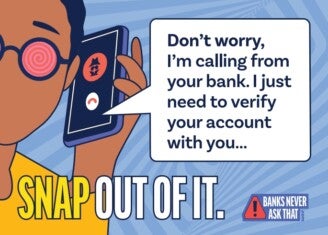Social media has become a mainstay in our culture, and it’s easy to get caught up in the sheer volume of posts, photos, news, and other content you see as you scroll through your feed. And while much of what you come across is harmless, scammers are using social media to take advantage of unsuspecting users.
Here are some of the ways that scammers and identity thieves use social media and how you can avoid falling victim to their tricks.
Impersonation Accounts
Have you ever received a friend request from a close friend or family member with whom you’re already connected? Some scammers will create impostor accounts imitating someone using publicly available photos, then try to get personal information or money from their social media followers via private messages.
They may also send you a link or ask you to download an attachment, which, when followed through, can download harmful malware on your computer, giving them access to all of your files.
The same can happen with business accounts. For example, they may contact you via Facebook Messenger or another messaging platform, posing as a company that you do business with.
They may tell you that they need to update or confirm your personal information or ask you to visit a link to verify some details.
In some cases, scammers are brazen enough to respond to comments on a legitimate business’ Facebook page using a profile that impersonates the business or one of its employees.
If you ever receive a request from a person or business asking you to give personal information or send money, treat it with suspicion. If it’s a business, simply call the organization directly to let them know you’ve received a message that you’re unsure of.
Some social media websites add a blue check to show that an account has been verified. If it’s a small business that hasn’t been verified, it should still show signs of legitimacy, including posts over a period of time, responses to customers, and other things that indicate normal behavior.
If it’s a person you know, check to see if there are two profiles out there for that person and contact your friend or family member outside of social media to confirm if they sent the message.
Fake Accounts
In some cases, scammers will create an account based on a person you don’t know and try to connect with you. For example, they may lift photos of an attractive person and show interest in you despite not knowing anything about you.
Once you connect, they may use the information found on your profile or messages to social engineer you, which involves deception to obtain personal information they can use to steal passwords and commit other crimes.
If someone you don’t know tries to connect with you on platforms like Facebook, LinkedIn or Instagram, check to see if you have mutual contacts. If you do, reach out to one of them to get more information about the person trying to connect.
If you have no mutual contacts, it’s best to avoid giving them access to your profile or to message them privately.
Finally, make sure that your Facebook and Instagram posts are private and only viewable by your connections. Even if you never accept a friend request from a scammer, they can still use public information found on your profile to get the details they need.
Fake Giveaways, Sweepstakes, and Other Offers
Some scammers will take the time to create a page impersonating a business, then offer gift cards, vehicles, and other items under the guise of marketing. For example, you may have seen friends share posts about free cruises, cars, or event tickets.
You may also see what looks like legitimate companies offering free live streams or tickets to an event.
In many cases, you have to click a link to provide your information or open a third-party application and authorize it to access your Facebook profile. In all cases, the scammer is looking to gather personal information, which it can use for nefarious purposes.
That said, real companies do run social media giveaways, sweepstakes, and live streams. But before you engage, check the profile for signs of legitimacy. Also, consider running an internet search for the offer to see if it’s listed on the company’s website — if it’s only on social media, that can be a major red flag.
Clickbait
Clickbait is content that is presented in a way that encourages social media users to click on a link to read more. It’s a tactic that many legitimate companies and media organizations use to get more views of their content.
It’s also used by scammers to try to get you to visit their website and either share personal information or purchase a product, where you’d provide your credit or debit card information.
For example, during the coronavirus pandemic, scammers took advantage of the fact that home gym equipment was hard to find. They’d advertise, take payment and either send inferior equipment or nothing at all.
If you come across a social media advertisement that seems too good to be true, run an internet search to learn more about the website. If it has no real online presence, it could be a scam. And if you click through to a website that immediately asks for personal information, be wary about providing it.
The Bottom Line
Social media can be a good way to keep up with loved ones, get the latest news, and even for entertainment. But it can also be a source of criminal activity. To avoid falling victim to a scammer, it’s important to be vigilant. Here’s a summary of some steps you can take to protect yourself and your information:
- Treat links with suspicion, especially if it’s from an unverified account or the link has been shortened, so you can’t view the destination website without clicking on it.
- Verify all connection requests.
- Avoid messaging with someone you don’t know.
- If an offer or giveaway looks too good to be true, verify it before you click.
- Make your profiles private where possible to avoid sharing personal information about yourself and family members to people you don’t know.
- Don’t share personal information with companies via social media.
- If you receive a request from a company or person that looks suspicious, call them directly to confirm whether the request is real.
When it comes to social media, scammers are banking on you having your guard down. But it’s absolutely crucial that you remain vigilant and avoid situations that don’t feel right and could potentially be a scam.
Information contained in this blog is for educational and informational purposes only. Nothing contained in this blog should be construed as financial, legal or tax advice. An attorney, financial advisor, and/or tax advisor should be consulted for advice based on your circumstances.
Links to other websites or references to services or applications are provided as a convenience only. A link does not imply SouthEast Bank’s sponsorship or approval of any other site, service or application. SouthEast Bank does not control the content of these sites, services or applications.




